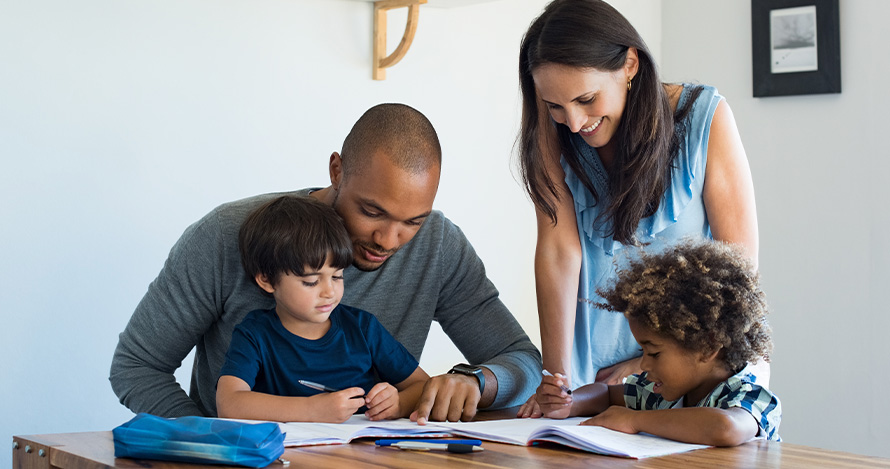As parents, we know the importance of raising children to respect and value people regardless of the color of their skin, their physical abilities or the language they speak. But teaching kids about diversity isn’t always easy. Every child is different and each situation presents different possibilities but by following a few steps you can lay the groundwork for your child to be open-minded toward others and embrace the differences that make all of us unique.
We always hear, 'Oh, my child doesn't even see skin color.' But kids absolutely do notice. Sometimes we may do this out of our own discomfort with delicate topics, like diversity, or because we think noticing differences somehow makes you biased. The truth is people do come in different colors. It is more important that children learn to accept others for who they are instead of pretending that differences don’t exist: Rebecca Bigler, Ph.D.
Encourage Questions
Has your child ever asked you why people look different, talk with an accent or celebrate different holidays? If your child has questions about differences in physical characteristics or cultural practices, discuss them openly as it teaches your child that it’s okay to notice differences, and more importantly, it teaches him that it’s good to talk about them.
"Today's kids are going to have to interact with people from many backgrounds and cultures, as well as with those who don't look or act like they do," says Rebecca Bigler, Ph.D., a developmental psychologist at the University of Texas at Austin, to Parents. "Celebrating diversity, not merely tolerating it, is going to be key to their success."
Set a Good Example
Many of us may believe we embrace diversity, yet often subtly communicate something very different to our children. Do you laugh when you hear a racial or gender joke? Are you willing to point out prejudice when you see it? No action is as powerful as the example we set for kids, especially when dealing with diversity. When children see adults that are culturally sensitive and respectful, and who take a stand against bias, racism or insensitivity, they in turn act the same. Also, if you witness your child acting or speaking out in judgment of diverse groups, nip it in the bud. Explain why it is important to treat everyone with kindness and equality.
Don’t Sugar Coat Diversity
Experts say one big mistake parents make is assuming that their children are unaware of race. "We always hear, 'Oh, my child doesn't even see skin color,'" Dr. Bigler continues. "But kids absolutely do notice." Sometimes we may do this out of our own discomfort with delicate topics, like diversity, or because we think noticing differences somehow makes you biased. The truth is people do come in different colors. It is more important that children learn to accept others for who they are instead of pretending that differences don’t exist."
At the same time, it’s crucial to teach kids to honor people's identities without judging or discriminating based on differences. In other words, noticing people's differences is natural, but when adults assign judgments or value to these differences, bias can develop in young children.
Learn About Other Cultures
Whether it’s watching a foreign film or television series from another region or country, trying new foods, or traveling to new places (even different neighborhoods), becoming engaged in multicultural experiences as a family can be a fun learning experience for everyone. Most communities have free cultural events hosted at places of worship, community centers, schools, and other organizations. Explore the calendar of events in your area to find kid-friendly events including interfaith gatherings, cultural festivals, art exhibits from foreign countries, and other activities. A good way to connect with different parents and gain valuable insight into how they deal with their children is The Children’s Trust’s new Parent Club. You can gain valuable skills and knowledge for your own parenting toolkit while also learning from parents from different cultures. To sign up visit www.TheChildrensTrust.org/ParentClub.
Children’s books are also a wonderful resource for helping your child develop a sense of his or her own identity, as well as an understanding of those who are different in terms of race, family composition, religious beliefs and ability. This year, The Children’s Trust is expanding its Read to Learn Book Club for all children from birth to 5 years old in Miami-Dade County. The free program sends a book a month to your child through the mail. To sign up via text, write “R-E-A-D” to 786.460.CLUB (2582).
Have Them Explore Their Own Heritage, Too
Family stories passed down through generations are likely to be rich with life lessons, tradition and cultural history. Where did your child’s ancestors come from? What adversities did they face?
Take a step beyond explaining the family tree and talk with your child about how family history is important to understanding diversity. Having a better understanding of family can often help children be confident in their identity, and as a result, more understanding and respectful of other cultures.

